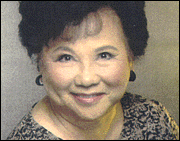Advertisement - Click to support our sponsors.


![]()
View Point
A Jan. 25 Star-Bulletin editorial commenting on the state auditor's report on the Felix consent decree emphasized what it currently costs Hawaii taxpayers and what it could cost tomorrow. I would like to point out that the decree is not about money or peripheral issues. It is about the children of this state, and their social and academic performances. Don’t be rigid
about special needsI know that teachers understand that. They care about their students and their education. We need to come up with innovative ideas that focus on what is best for the special- needs child.
In this process, we must also provide for parental choice. Every situation is different and each situation must be separately assessed. The DOE is doing its best but does not have enough qualified personnel to make those assessments.
One model to consider is the use of alternative schools. For example, in Montgomery County, Md., they have developed an extremely workable system for special-needs students. They are referred to a board that determines an Individualized Education Program (IEP) for each of these students. They are referred by teachers, doctors, social workers and law enforcement officials.
Montgomery County offers many options. There are 17 alternative schools part of the public education system. They include those for students who are considered seriously disruptive, have substance abuse problems, are homeless or have emotional problems.
One school, in particular, deserves mention. That is the Regional Institute for Children and Adolescents (RICA). This is a public school that serves approximately 180 special-education students with serious emotional problems in a day and residential therapeutic treatment center. About 100 are day students and another 80 live in residential cottages.
Another alternative program deserving mention are the Phoenix I and Phoenix II schools -- designed for 70 students with drug abuse problems. The Phoenix program includes academic instruction toward a high school diploma in a drug-free environment. Electives are based on a 12-step recovery program that includes weekly urinalysis and group counseling.
Maryland just passed a charter school law last year and it is expected that there will be charter schools for separate needs students as well.
WE could do that in Hawaii except that our charter school law is very weak. A charter school is an independent public school that is designed and operated by educators, parents, community leaders and others.
The others could include support organizations like the Coalition for a Drug-Free Hawaii, the United Cerebral Palsy Association of Hawaii Foundation or the Autism Society of Hawaii. They would help design the curriculum and aid in providing whatever special equipment or expertise is necessary.
Some may object, saying this is moving away from "mainstreaming." But mainstreaming should be a option too, because it can be an extremely difficult situation for a classroom teacher without extra help and may not be the right answer for some special-needs students.
I suggest that we need to be more innovative in our thinking and to remember that it is the children and their education that really count.
Republican Rep. Bertha Leong represents
the 16th District (East Honolulu) in the state
House of Representatives.